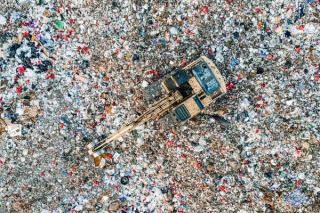
Turning waste into energy and recycling with enhanced landfill mining
- Post Date
- 19 May 2022
- Read Time
- 4 minutes

With the ever-growing demand for resources there is an increasing need to find new technologies and reserves to support societies. While existing resources become stretched, landfill mining is a concept developing across the globe, which explores the opportunity to use our discarded waste as a new resource.
Enhanced Landfill Mining (ELFM) is the process of extracting and recycling or reusing waste buried in a landfill, thus exploiting materials otherwise locked underground. The UK alone has over 20,000 landfills which store millions of tonnes of waste buried over the past 100 years. This figure is dominated by historic landfills, which existed before recycling legislation was introduced in 1999, and hold significant amounts of valuable materials.
Depending on the original waste stream for the landfill, they can contain many different types of extractable materials. To identify these valuable materials, ELFM uses soil excavating and processing techniques to excavate, screen and sort waste.
Key recyclable materials which can be extracted include soil, plastic and metals, while oversized materials such as appliances, wood, and tires can be also be extracted and sold for recycling of parts or reuse. Resultingly, these recovered waste streams can be utilised through waste-to-energy (WtE), waste-to-material (WtM) or waste-to-land (WtL).
A study conducted of four UK landfill sites found they each contained an average of over £100 million in valuable metals[1]. Industrial waste landfills can contain residues of metals including zinc, aluminium, copper or steel, with significant quantities of these in short supply or central to certain important technologies, such as wind turbines. Palladium metal, used in catalytic converters, and Neodymium, which creates powerful magnets can also be found buried in landfills. Along with these finer fractions of metals, there can often be separate larger fractions containing metals such as aluminium cans or copper wires, which can be recycled or reused.
Equally, municipal solid waste landfills contain a wealth of glass, plastic, metals or aggregates which are directly recyclable. Soils or biodegradable waste within municipal waste landfills can also be recovered and burned for fuel.
Why Landfill Mining?
ELFM has several significant benefits;
- As resources are becoming scarcer, the value of waste increases and materials locked in landfills could be key to battling resource scarcity;
- The UK is running out of available space for development, and mining landfills could make available otherwise unusable space; and
- ELFM and the use of waste encapsulates the push of waste management towards recovery, recycling and re-use across the UK.
Along with these key benefits, ELFM can result in additional benefits such as;
- Mitigation of environmental impacts resulting from a landfill (i.e. soil pollution, pollution of watercourses, pollution of surrounding natural resources);
- Enhancing the value of adjoining land;
- Improving local community health through removal of landfill hazards;
- Revenue from extracted materials and increased employment; and
- Reducing or removing costs related with landfill aftercare and monitoring.
While ELFM is not a new concept, its exploration within the UK is limited. Challenges associated with asbestos, pollution concerns from waste disturbance and issue with recovery costs, coupled with limited studies, mean there are little to no examples of landfill mining in the UK. However, as improvements in screening and recovery technologies and procedural advancements continue to minimise costs and increase the efficiency of ELFM processes, the prospects of ELFM projects are progressing rapidly.
How can SLR help?
The benefits which could be gained through ELFM to the environment, community and economy are those which resonate with the values in SLR. With a proven track record across permitting, environmental management and engineering in the landfill sector, SLR is well placed to assist in the feasibility, scoping and delivery of ELFM projects globally. If you need assistance with an ELFM project, please contact Greg Altria (Principal Consultant - Environment Management, Permitting & Compliance) or Maria Francis (Senior Consultant – Environment Management, Permitting & Compliance) through our contact form.
[1] Discovering the hidden wealth in closed landfill sites, Cranfield University.

